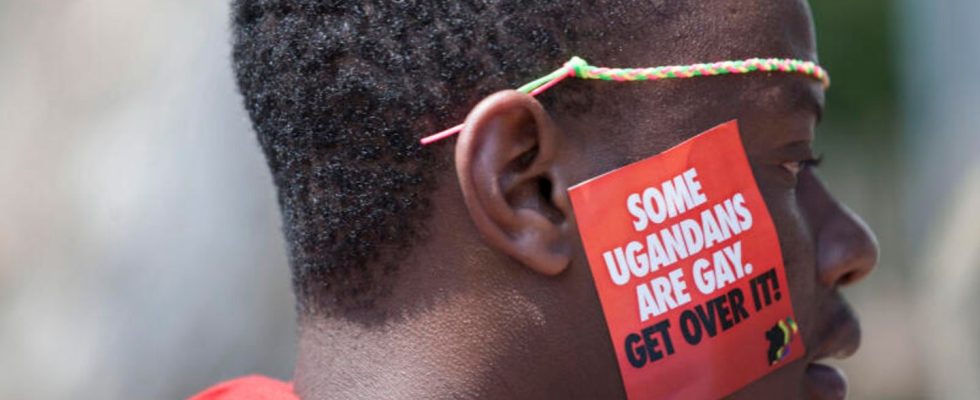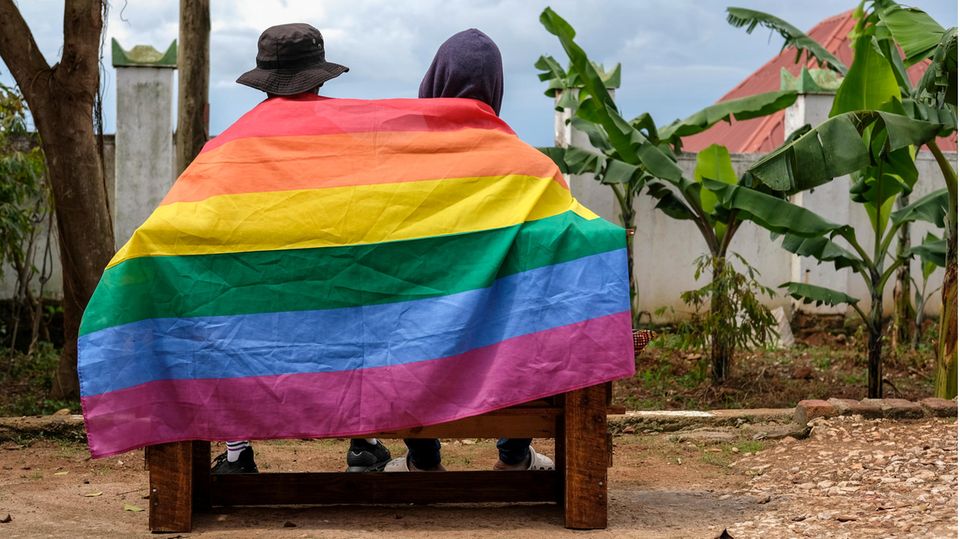Uganda has long been a dangerous place for homosexuals. Now the government is going a step further – despite the international outrage. Anyone who is “seriously” gay should expect death here from now on.
“Thank you for stopping by, good morning. Why are you gay?”
When moderator Simon Kaggwa Njala greeted the LGBTQ activist Pepe Julian Onziema with this question at a discussion on Ugandan television in 2012, he could not have guessed that the start of the conversation, which he considered harmless, would be haunted millions of times on the Internet years later. Eleven years later, what he calls the “funniest African interview of all time” has more than 29 million views on YouTube.
Today the clip is literally gallows humor. According to a new law, homosexuals in Uganda are not “only” threatened with a long prison sentence, but in the worst case with death. In the West, the outrage is great. So big that legalized homophobia could become expensive for the East African country.
Those who are “seriously” gay face the death penalty
So far, the law in Uganda has already been that the mere attempt to enter into a homosexual relationship can be punished with up to ten years, same-sex sex even with life imprisonment. The “anti-homosexuality law” passed by the Ugandan President on Monday goes far beyond that. For so-called “serious” cases, the legislature provides for the death penalty in the future. This also means that anyone who has homosexual sex with a person under the age of 18 or is infected with HIV (regardless of whether the carrier himself knew about it) must now fear for his life. The criminal offense of “attempted serious homosexuality” is punished with a prison sentence of up to 14 years. Anyone who “knowingly promotes” homosexuality faces up to two decades behind bars. What exactly is meant by this remains unclear. Critics believe the wording was intentionally vague to make it easier for the government to restrict the work of activists.
MP Asman Basal Irwa, who introduced the law to Parliament, told the BBC that while “nobody minds it when two adults have homosexual sex in private”. Authorities would also not actively search for homosexuals. In fact, the new law makes it clear that homosexuality isn’t illegal per se – it’s the acting out that counts: “But if you try to do it in public and then enlist others to do it your way, that’s it a problem,” claims the parliamentarian
It was foreseeable that things would get (even) worse for the LGBTQ community in the landlocked country with 47 million inhabitants. The corresponding draft had already become known at the end of March (the star reported). At the time, 387 of the 389 MPs in the parliament of the capital Kampala voted for a massive tightening of the already rigorous anti-LGBTQ legislation. At the final vote in Kampala, MPs shouted homophobic comments, with one MP calling for homosexuals to be castrated.
Uganda makes law legally watertight
President Yoweri Museveni initially expressed doubts about the draft and returned it to the Chamber for revision. The reason for this, however, was certainly not inhibitions on the part of the head of state. The 78-year-old, who has been in power for more than three decades, is considered openly homophobic and has publicly described homosexuals as “disgusting”. Rather, the reason for his skepticism was that the draft would be legally rejected anyway. The difference between homosexuality and homosexual sex must be made clearer in order to make the law legally unassailable.
After the MPs had weakened the law slightly from their point of view (among other things, citizens who do not report homosexual acts no longer have to fear imprisonment), Museveni did not hesitate any longer – the draft ultimately passed the authorities at record speed. Parliament Speaker Anita Among thanked the President. In her opinion, the new law protects the “inviolability of the family”.
Massive criticism at home and abroad: US President Joe Biden is considering sanctions
“The Ugandan President today legalized state-sponsored homophobia and transphobia,” the Reuters news agency quoted Ugandan LGBTQ activist Clare Byarugaba as saying. Meanwhile, an association of activists and lawyers allegedly wants to file a lawsuit. A similar law was overturned by the constitutional court when it came into force in 2014 – archconservatives had brought the corresponding draft into parliament five years earlier with the title “Kill the gays”.
It was not only in Uganda that people reacted with horror to the passing of the law. Even beyond national borders, but above all in Western countries, NGOs and governments sharply criticized the decision. In a joint statement World’s leading health campaigns condemned the law and expressed deep concern over its “harmful effects”. Already, according to the signatories, the “stigma and discrimination associated with the law have resulted in limited access to prevention and treatment services [von HIV-Patienten, Anm. d. Redaktion] guided”.
What ultra-conservative forces nevertheless celebrate as a great victory could cost Uganda dearly – literally. The fact that US President Joe Biden described the law on Monday as a “tragic violation of general human rights” and called on the Ugandan government to reverse the law is probably only the first step. Washington is considering “additional steps, including imposing sanctions and restricting entry into the United States, against anyone involved in serious human rights abuses or corruption.”
As an important trading partner of the USA, Uganda benefits, among other things, from the African Growth and Opportunity Act, which gives the East African state easier access to the lucrative US market. Support funds in the billions are also on the brink. As “Africa News” reports, Ugandan politicians have so far been unimpressed. The news portal quoted a member of parliament as saying that should Western governments and investors turn off the money supply, efforts would be made in the Arab world to develop stronger partnerships.
Right-wing religious wave threatens LGBTQ rights in Africa
In strictly Christian Uganda itself, the law has met with broad approval. According to reports, there have been repeated street protests in recent weeks and months, in which religious groups have called on the government in Kampala to protect their Christian values. Right-wing interest groups outside the country, such as Family Watch International, based in the US state of Arizona, are also said to have deliberately influenced the Ugandan population and politics.
Arch-conservative politicians had repeatedly spread unsubstantiated claims that there was a conspiracy to promote homosexuality in schools. According to The New York Times, Stephen Samuel Kaziimba, archbishop of the Anglican Church of Uganda, has claimed that LGBTQ groups are “recruiting our children to be homosexual”.
Lost Places in Africa
Elizabeth Bay: Namibia’s ghost town by the sea
Even before the realignment, Uganda was considered one of the most dangerous countries for homosexuals. However, the landlocked country is by no means an exception on the African continent. Homosexuality is tolerated in less than half of all African countries and actively protected in even fewer countries. So far, members of the LGBTQ community have been persecuted, especially in strictly Muslim countries – in Mauritania, Somalia and Nigeria the death penalty is already threatened. However, Uganda is seen as a harbinger of an increasingly radical Christian persecution of homosexuals: The governments of the majority Christian Ghana and Kenya are considering tightening anti-LGBTQ laws. Uganda could only be the spearhead of a right-wing anti-LGBTQ wave on the continent.
Sources: BBC; “New York Times“; Reuters; “Africa News“


